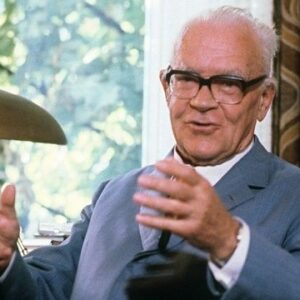Georg Wittig was a German chemist who won a share of the Nobel Prize in Chemistry in 1979. He developed a method for synthesis of alkenes from aldehydes and ketones using compounds called phosphonium ylides which later came to be known as the Wittig reaction. The son of a professor, he developed an early love for science and started studying chemistry at the University of Tübingen in 1916. The ongoing World War I, however, interrupted his studies and he was drafted into the army. His military experience was traumatic and he was taken a prisoner of war by the British forces in 1918. He was released the next year but faced considerable trouble in resuming his studies as the universities in Germany were already overcrowded. In desperation, he made a plea to the professor for organic chemistry at the University of Marburg, Karl von Auwers, who accepted the young man into the institution. Wittig was an intelligent and hardworking student who after three years of rigorous studies was awarded the Ph.D. in organic chemistry. On the advice of his mentor, von Auwers, he ventured into an academic career. After working at the TU Braunschweig and the University of Freiburg, he eventually succeeded the head of the organic chemistry department Wilhelm Schlenk at the University of Tübingen.
Childhood & Adolescence
Georg Wittig was born in Berlin on June 16, 1897, and grew up in Kassel, Germany, where his father was a professor of applied arts. As a child, he was taught to play the piano by his music-loving mother.
After completing his secondary education in 1916, he enrolled at the University of Tübingen to study chemistry. His studies, however, were disrupted by the ongoing World War I, and the young man was drafted into the army and appointed a lieutenant in the Hesse-Kassel cavalry (or Hesse-Cassel).
In 1918, he was taken prisoner of war by English forces during his military career. He was desperate to resume his studies following his 1919 release. However, all German universities were overcrowded at the time, and Wittig was unable to enroll in any educational institution.
He made a direct appeal to Karl von Auwers, the University of Marburg’s professor of organic chemistry at the time, and was admitted to the institution. He was a bright student who excelled in his studies. He graduated in 1923 and completed a three-year Ph.D. in organic chemistry in 1926.
Career of Georg
Georg Wittig followed von Auwers’ advice and became a lecturer in chemistry at Marburg following the completion of his Habilitation (permission to lecture in a university). He became close friends with Karl Ziegler during his years there, who was also completing his habilitation with von Auwers.
Karl Fries invited him to join the TU Braunschweig as a professor in 1932. The 1930s in Germany were a period of political anarchy, with the Nazi party gaining increasing power. Fries was a vehement opponent of the Nazis, which prompted the Nazis to attempt to eliminate him. Wittig, who backed Fries, was also fearful for his own job.
Eventually, the Nazis succeeded in forcing Fries into retirement. Fortunately for Wittig, Hermann Staudinger, director of the University of Freiburg in Breisgau’s Chemical Institute, invited him to become an associate professor there in 1937.
Wittig’s tenure in Freiburg was distinguished by intense research that laid the groundwork for carbanion chemistry.
He accomplished significant work during his years at the university, including the formulation of dehydrobenzene and the discovery of a new class of ammonium ylides.
Wilhelm Schlenk, head of the organic chemistry department at Tübingen University, died in 1943. Georg Witting succeeded Schlenk as full professor and director of the university’s Chemical Institute the following year.
Following the conclusion of World War II, Wittig was able to establish a highly active research group comprised of young scientists. He was well-known as a meticulous teacher who set extremely high expectations for his students.
He was widely regarded as a highly successful mentor who inspired several bright young minds to pursue careers in academia.
In 1956, he succeeded Karl Freudenberg as head of the University of Heidelberg’s department of organic chemistry.
He remained employed there until 1967, when he retired. He published over 300 scientific papers over the course of his long and illustrious career.
Significant Works of Georg
He discovered the Wittig reaction, which is the reaction of an aldehyde orketone with a triphenyl phosphonium ylide to produce an alkene and triphenylphosphine oxide. It is frequently used in organic synthesis to synthesize alkenes.
Georg Wittig discovered the 1,2-Wittig rearrangement, which is a method for classifying chemical reactions in organic chemistry. It entails the 1,2-rearrangement of an ether with an alkyllithium compound.
He is also credited with discovering the [2,3]-Wittig rearrangement, which refers to the concerted, pericyclic transformation of an allylic ether into a homoallylic alcohol.
Awards and Accomplishments
He was awarded the prestigious Otto Hahn Prize for Chemistry and Physics in 1967. Georg Wittig and Herbert C. Brown shared the 1979 Nobel Prize in Chemistry “for their development of boron- and phosphorus-containing compounds as important reagents in organic synthesis, respectively.”
Personal History and Legacies
In 1931, Georg Wittig married Waltraud Ernst. His wife, who worked in von Auwers’s group as well, earned a doctorate and supported her husband’s scientific endeavors until her death in 1978. The couple was blessed with three daughters.
He lived a long life and was afflicted with illness in his later years. He died on August 26, 1987, just a few weeks after reaching the age of 90.
Estimated Net Worth
Georg is one of the wealthiest chemists and is listed on the list of the most popular chemists. Georg Wittig’s net worth is estimated to be around $1.5 million, based on our analysis of Wikipedia, Forbes, and Business Insider.


